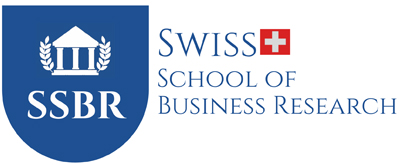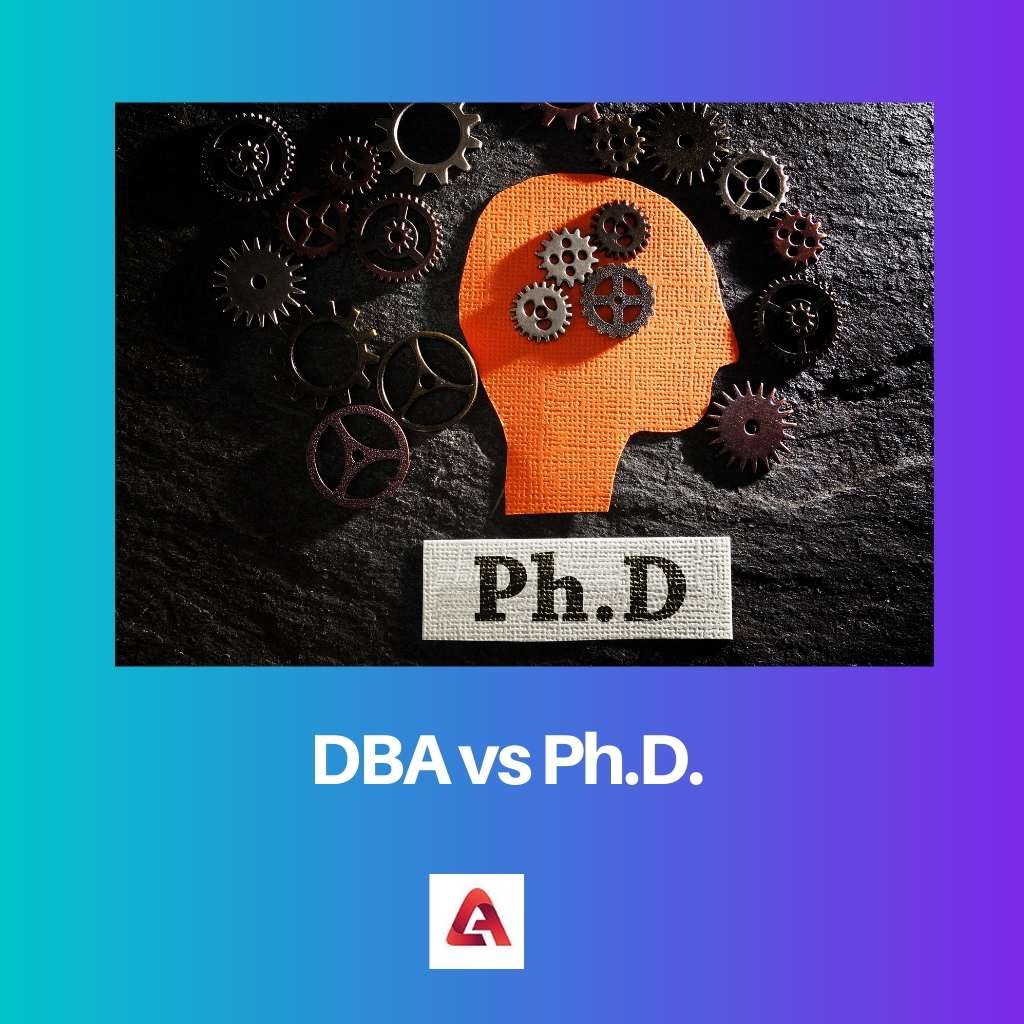

DBA vs. PhD: Which is Better?
by Laura Perez | Feb 4, 2024 | Uncategorized

In the realm of academia, a question lingers: Which degree commands greater respect, the Doctor of Philosophy (PhD) or the Doctor of Business Administration (DBA)? Join us as we delve into the nuances of these esteemed degrees and explore their respective contributions to knowledge and practice.
In the ever-evolving landscape of business education, two prominent degrees compete for recognition and prominence: the Doctor of Business Administration (DBA) and the revered Doctor of Philosophy (PhD). Both titles command respect and curiosity, but what sets them apart? Join us as we navigate the corridors of academia and unravel the intricacies of these prestigious degrees.
Defining the Degrees: 1. DBA: Often referred to as the “practitioner’s PhD,” the DBA bridges the gap between theory and practice. It combines rigorous research with real-world application, serving as a compass for executives, entrepreneurs, and industry leaders, guiding them through the complexities of modern business.
Check out swiss School of Business Research DBA: https://www.ssbr-edu.ch/doctorate-business-administration/ 2. PhD: Rooted in centuries of scholarly tradition, the PhD represents mastery of a field. It is the pinnacle of intellectual pursuit—a journey fueled by curiosity, critical thinking, and original research. Think of it as a lighthouse illuminating uncharted waters of knowledge.
Check out swiss School of Business research PhD: https://www.ssbr-edu.ch/doctorate-business-administration/
The Quest for Knowledge: 1. DBA Journey: DBA candidates delve into business challenges armed with academic rigor. Their research aims to solve practical problems, enhance organizational strategies, and drive innovation. They act as navigators charting courses for sustainable success. 2. PhD Odyssey: PhD aspirants embark on an intellectual odyssey. Their voyage involves deep dives into theory, empirical analysis, and groundbreaking discoveries. They serve as cartographers, mapping the contours of knowledge.
Different Paths, Shared Goals: 1. DBA Focus: The DBA’s compass points towards actionable insights. It thrives on collaboration, case studies, and industry partnerships. DBA holders emerge as change agents, armed with evidence-based solutions. 2. PhD Essence: The PhD’s lighthouse beckons scholars to explore uncharted territories. It thrives on solitude, academic debates, and paradigm shifts. PhD holders emerge as thought leaders, shaping disciplines.
Disciplines Explored: 1. DBA Terrain: DBAs explore management, leadership, strategy, and organizational behavior. Their research informs boardrooms, startups, and multinational corporations. They serve as bridge builders between academia and the C-suite. 2. PhD Landscape: PhDs traverse diverse fields, including humanities, social sciences, natural sciences, and beyond. Their contributions span literature, psychology, physics, and more. They act as custodians of knowledge, preserving and expanding it.
The Ultimate Question: Weight in the Business World? 1. DBA Impact: In boardrooms and corner offices, DBAs wield influence. Their actionable insights resonate with decision-makers. They are pragmatic visionaries, translating research into bottom-line results. 2. PhD Legacy: In lecture halls and research labs, PhDs shape minds. Their theories ripple through academia, policy, and innovation. They are torchbearers, igniting curiosity and pushing boundaries.
There is also a third option from Swiss School of Business Research for experienced business executives. The PhD by Portfolio. A PhD by portfolio can be completed within one year. The award enables candidates to obtain academic recognition for pre existing research, comprehensive research skills and subject knowledge that meets a doctoral level.
The PhD by portfolio programme is a fast track programme that takes place entirely ONLINE . Students can complete the programme within 1 academic year, to gain a Swiss quality doctorate degree. The programme has 240 ECTS (European Transfer Credit System).
Our PhD students are guided throughout the entire programme by a business mentor, working to complete 3 research-based projects.
Check out our ONE YEAR PhD by Portfolio: https://www.ssbr-edu.ch/phd-by-portfolio/
Conclusion: So, which degree holds more weight? The answer lies in your compass—your aspirations, context, and purpose. Whether you seek to steer organizations or unravel mysteries, both the DBA and PhD shine brightly in the academic constellation. Choose wisely, and may your voyage be rich with discovery. Explore the academic universe at SSBR Education—where degrees become constellations!
At the forefront of this pioneering approach to executive education is the Swiss School of Business Research, championing the PhD by Portfolio in Management. With a commitment to academic excellence and a deep understanding of the unique challenges faced by senior professionals, the school is redefining the landscape of doctoral education. Through this innovative programme, SSBR provides a platform where business acumen and strategic leadership are not just learned but also academically celebrated, enabling executives to achieve a doctoral level qualification that mirrors the magnitude of their professional achievements.
Don’t forget to follow us :)
Recent Posts
- Dr. Stephen Harrison: Visionary Leadership at the Swiss School of Business Research
- Celebrating Achievement and Innovation The 2024 SSBR Graduation Ceremony
- Named in the Top 10 most recommended Business school of 2024
- What is the fastest PhD to get?
- Can you get a PhD in one year?
Powered by WhatsApp Chat
WhatsApp Chat is free, download and try it now here!
What can we help you find?
Frequently searched
- Program Comparison
- How to Apply
- Financial Aid
- Executive Education
DBA vs. PhD: What’s the Difference?

You’ve tackled your undergraduate business degree, and now you’re feeling ready to take your business education one step further. You might be wondering, “Where do I even begin?” If this sounds like you, you’ve come to the right place. When it comes to upper-level business degrees, there are a wide variety of options. Two popular options are the Doctor of Business Administration, or DBA, and the Doctor of Philosophy, or PhD. Both options can be an excellent fit for students who are eager to dive even deeper into the world of academia. In this article, you’ll get a better understanding of the difference between the two degrees and gain some insight as to which degree program is the best fit for you.
What Is a DBA?
A Doctor of Business Administration, or DBA degree, is considered a “terminal degree.” This designation simply means that the degree is the highest level of education one can receive in the business world. These degrees are centered around business education with a major emphasis on management. DBA programs often entail a research component that focuses on real-life business problems. Throughout their studies, DBA students learn to apply various theories in solving real issues faced by today’s businesses. This degree is primarily geared toward individuals who currently hold a master’s degree in business or another closely related subject.
What Is a PhD?
PhD programs are another excellent choice for those wishing to further their education. This is also considered a “terminal degree,” and it is the highest-level research degree that one can obtain. These programs involve rigorous research and extensive study. While you’re likely interested in a PhD degree in the business field, nearly any subject can provide this research-based degree, from science, to humanities, to everything in between. While DBA programs are typically intended for students who hold a master’s degree, PhD programs welcome students after completing a bachelor’s or master’s degree in a related discipline. They are the ideal choice for anyone who might be interested in carrying out research or teaching in an academic institution.
Coursework and Duration: Comparing the Curriculum
While both DBA programs and PhD programs give students a deep understanding of the theories that drive the world around us, they do so in different ways. In a Doctorate of Business Administration program, you’ll focus exclusively on business and management from a practical lens. Application of theory is a major focus, and coursework often provides students with opportunities to put their knowledge into practice by solving real-world business problems. Alternatively, PhD programs are offered in just about any subject one can imagine. They take a more theoretical approach with their curricula, teaching students to understand the “why” and “how” behind both business problems and their solutions.
The typical timeline of these graduate programs differs as well. Since DBA programs are intended for people who already have both a master’s degree and significant work experience, they tend to take less time to complete. Many DBA programs are offered on a part-time schedule, and students can expect to complete their Doctorate of Business Administration in about two to four years. While PhD programs don’t always require as much experience prior to enrolling, they tend to require more time to complete. These research-intense programs usually follow a full-time course schedule with an average completion time that ranges from three to five years.
Practical Experience vs. Thesis Research
The major difference between a DBA education and a PhD education can be summed up as practical vs. theoretical. Students entering into a DBA program typically come with a master’s degree in hand and multiple years of relevant work experience under their belt. As such, DBA programs are designed to expand upon their students’ wealth of prior knowledge and experience. These programs teach students to understand relevant theories and principles of business management, but more importantly, they teach students to apply those theories and principles. DBA programs equip students to bring their education and experience to the table when solving real-world problems.
While DBA students focus on using existing knowledge to solve problems, students in PhD programs work to add new knowledge to the business world. Instead of researching the application of existing theories and principles, PhD students are expected to work on original research, unearthing and exploring new ideas. Thus, PhD programs take a much more theoretical approach rather than a practical one. To put their newly gained insights on display, PhD candidates are usually required to complete a dissertation. Through these lengthy research projects, students demonstrate their knowledge, expand upon their ideas, and showcase their experience.
Career Outcomes of a DBA vs. a PhD in Business Administration
Following completion of their degree, DBA and PhD graduates typically take two different paths when it comes to employment. Much like an MBA, a Doctor of Business Administration prepares students for jobs in both the private and public sector. DBA candidates often go on to work in senior management roles or consulting. Some even choose to open their own businesses. Their practical, hands-on approach ensures that DBA programs leave their graduates well-equipped for these roles.
On the other hand, PhD candidates typically stick to the world of academia following their graduation. They often find work with universities as professors and can even go on to be program directors. Some graduates may also opt to continue expanding upon their research while they teach, sharing their research methods with the next generation of PhD students.
However, as with any degree, the job you’ll find afterward depends on a number of different factors. Your prior work experience and unique strengths gained from both work and the classroom play a big part in determining where you’ll take your talents. Just like your interests and passions will likely guide your choice between DBA and PhD programs, they’ll also guide your job search. External factors do play a role as well. The current job market will decide what specific jobs are available at one time or another, and demand for your specific skill set can determine how well you fit the profile of those available jobs.
DBA or PhD: Which Is Right for You?
Deciding to further your education with a doctorate degree is a huge decision in and of itself. Having to choose between a Doctor of Business Administration and a Doctor of Philosophy might be an even more challenging decision. Each of these programs is considered a “terminal degree,” offering students the highest level of education possible in the field. They provide candidates with advanced training and preparation for high-ranking roles. Whether you opt for a DBA or a PhD program, you’ll be opening doors to a wide range of career opportunities.
To ensure that you make the right choice between the two degrees, you’ll want to take time to think about your career goals. Consider where you are now as well as what you want your career to look like in 5, 10, even 2o years. Do you hope to hold a title as a C-suite executive of a major corporation, calling the shots and leading the teams around you? Or do you hope to be in the classroom, teaching the next generation of business professionals about both new and existing theories in the business industry?
Be sure to spend some significant time weighing out these options, including any accreditation requirements. Once you feel confident in the goals you’ve set, look for programs that are in alignment with the things that are most important to you. Check out the academic career resources and coursework of each program you’re interested in. Give yourself the time and space to carefully consider each of these factors prior to making a decision.
Final Thoughts
Getting a doctorate degree can be an excellent way to take your career to the next level . No matter whether you opt for a DBA or a PhD, these terminal business degrees can make your application stand out among the rest and open doors to previously unattainable job opportunities. DBA programs are a perfect fit for people looking to grow their base of practical knowledge in the field. They prepare graduates to work in upper-level leadership roles within the business environment, solving real problems that companies face on a day-to-day basis. Alternatively, PhD programs are the ideal choice for anyone with an interest in the principles and theories that guide business decisions and outcomes. These programs equip graduates to take on roles in the world of academia, such as research and teaching.
However, before you take the jump into your DBA or PhD, be sure to take time to thoughtfully consider your decision. Use your career goals as a guide, and take the time to research your options thoroughly. Seek out advice from peers in the field, and learn from the stories of others making an impact in the business world, like one Crummer Executive MBA student who has a strong passion for both business and academia.
Related Articles

The Future of Crummer Alumni Engagement: Meet Zack Poe ’23MBA

Strengthening the Crummer Network: Welcoming New Leaders to the Crummer Alumni Board

BeamBloxx Envisions State-of-the-Art and Comfortable Eye Protection from Lasers
DBA vs PhD.: Difference and Comparison
Doctorates are an esteemed degree for anyone to have in any industry. DBA and PhD are different types of doctoral degrees that teach and prepare you for different occupations.
They both have identical standing and recognition, just in different fields.
Key Takeaways A DBA, or Doctor of Business Administration, focuses on practical business applications, while a PhD, or Doctor of Philosophy, is more research-oriented and theory-based. DBA graduates pursue management, consulting, or entrepreneurship careers, while PhD graduates work in academia or research institutions. Both DBA and PhD programs require original research and a dissertation. Still, the DBA emphasizes practical solutions to business problems, while a PhD focuses on contributing new knowledge to the field.
DBA vs PhD.
A Doctor of Business Administration (DBA) degree is a professional doctorate focusing on applying business theories and practices to real-world business problems. A Doctor of Philosophy (PhD) degree is a research-focused academic degree emphasising original research.

A Doctor of Business Administration (DBA) is a professional doctorate in business. It is the highest-level postgraduate qualification available from a university, similar to a PhD.
The degree program is designed to provide practical and innovative business management knowledge that can be applied in any industry.
Similar Reads
- DBA vs LLC: Difference and Comparison
- DNP vs PhD: Difference and Comparison
- Ed.D vs PhD.: Difference and Comparison
- PsyD vs PhD: Difference and Comparison
- Masters vs PhD: Difference and Comparison
DBAs are intended for experienced practitioners, such as senior managers, consultants, and entrepreneurs, who want to expand their practical knowledge.
A PhD is the highest postgraduate qualification, and universities award a doctorate.
It entails conducting original research in a certain topic area and normally takes four years. PhD candidates conduct research, develop ideas, and test them, whereas DBA candidates apply those theories and methods to solve difficult real-world business challenges.
Comparison Table

What is DBA?
‘DBA’ is an abbreviation for Doctor of Business Administration.
A DBA student is an established business professional who wants to improve their leadership skills and their chosen business career as a whole.
The development of DBA programs within universities arose from the requirement for top managers and professionals to receive official recognition of their significant abilities and expertise in the business field.
DBA programs run for three to six years. The DBA is primarily concerned with practical research that attempts to meet the needs of industry and the economy.
This type of doctorate was initially introduced to distinguish between experienced and expert practitioners.
The doctorate is an advanced follow-up to a Master’s in Business Administration and an equal option to a standard PhD.
The DBA program is meant to provide advanced research skills and resources to business professionals and executives for them to excel in their careers.
DBA has several advantages, including that it is one of the most highly regarded degrees. Your professional knowledge and contribution to business theory will be greatly regarded.
You will grow as a more empowered professional, gaining leadership abilities in various business domains.
A DBA will increase your employability and enable you to explore a variety of career pathways in business, research, management, and academia.
As future employers notice your dedication to earning your DBA, your salary potential will rise.
A doctorate in business is highly valued, offering you a competitive advantage in the employment market.

What is PhD?
The PhD (also known as a PhD Doctor of Philosophy) is the highest postgraduate degree that may be obtained at a university. Ph.D. recipients are permitted to hold a teaching post at a university.
A PhD in Business Administration provides a specialized and research-based grounding for a topic in the field of business management.
This is one of the primary reasons it is highly sought after by anyone seeking to work in business-related academia or research.
To be eligible for a PhD program, you must have a bachelor’s and a master’s degree. However, the specific qualifications will vary based on the institutions you apply to.
There are numerous advantages to obtaining a PhD, including the fact that it is the highest degree that can be obtained.
The substantial training required to obtain a PhD enables you to deal with difficult situations professionally and personally.
You will learn to source information efficiently and effectively as a skilled researcher. You will greatly improve your analytical ability, organizational skills, and self-confidence.
You will be acknowledged as an expert in your chosen field and admired for contributing significantly.
You will have access to many work opportunities in academia, research, and other industries that require a PhD.
Most importantly, you will have the opportunity to pursue, investigate, and discover a field in which you are interested.

Main Differences Between DBA and PhD.
- DBA stands for Doctor of Business Administration, while PhD stands for Doctor of Philosophy.
- For a DBA, you do research directly relevant to real-life business issues, whereas, for a PhD, you do research to address existing problems or answer questions.
- The career opportunities after getting a DBA degree are related to higher management jobs or consulting jobs, whereas a PhD helps direct you in an academic career.
- DBAs take longer to finish because most people prefer to have a job while completing it, whereas a PhD takes a shorter time.
- DBA can be full-time or part-time for people doing it along with a job, whereas a PhD is mostly full-time.
- It is more expensive to finish a DBA degree, while a PhD is more affordable.
- A person with a DBA degree has a higher average salary than a PhD.

References
- https://www.tandfonline.com/doi/abs/10.1080/08832323.2018.1438983
- http://www.proceedings.informingscience.org/InSITE2006/IJDSv1p035-044Fink14.pdf
I’ve put so much effort writing this blog post to provide value to you. It’ll be very helpful for me, if you consider sharing it on social media or with your friends/family. SHARING IS ♥️
Emma Smith holds an MA degree in English from Irvine Valley College. She has been a Journalist since 2002, writing articles on the English language, Sports, and Law. Read more about me on her bio page .

14 Comments
Having a DBA degree will not only expand your professional knowledge, but also help you excel in your career. It is a great opportunity to invest in personal and professional growth.
Absolutely! DBA is a fantastic option to develop the leadership abilities and get a competitive advantage in the employment market.
ADBA can be a great option for experienced practitioners who want to expand their practical knowledge and increase their employability in various career pathways. The value of a doctorate in business cannot be underestimated.
Indeed, a DBA degree can offer a competitive advantage in the employment market.
DBA and PhD are two degrees designed for different career aspirations. A person must choose between them based on their professional goals and aspirations.
Indeed. The choice between a DBA and a PhD depends on the individual’s career prospects and their interest in practical applications or research.
Yes, the career opportunities and the time and cost commitment are crucial factors to consider.
Getting a PhD offers extensive training that really allows you to excel in your analytical abilities and be recognized as an expert in your field. If you are interested in pursuing, investigating and discovering a field, then a PhD might be the better choice.
It is a good point, but the cost and time commitment are important factors to consider. A PhD is not for everyone, as it requires a great deal of dedication and effort.
I completely agree. The PhD path is intended for those who want to dive deep into research and excel in academia or industry, without worrying so much about the cost and time commitment.
A DBA or PhD degree requires a great deal of hard work and dedication without a doubt. They both offer unique career paths and opportunities to grow professionally.
Absolutely, the decision between the two should be based on the individual’s career and research aspirations.
The PhD offers extensive research training and avant-garde knowledge in a niche area. It is an ideal choice for those with a keen interest in research and academia, although the DBA also has its unique advantages.
Absolutely, a PhD offers in-depth research opportunities and a chance to contribute to a field.
Leave a Reply Cancel Reply
Your email address will not be published. Required fields are marked *
Name *
Email *
Add Comment *
Save my name, email, and website in this browser for the next time I comment.
Post Comment
Want to save this article for later? Click the heart in the bottom right corner to save to your own articles box!

- DBA vs PhD – Differences Explained
- Types of Doctorates
Is a DBA and PhD Equivalent?
A Doctor of Business Administration (DBA) is equivalent to a Doctor of Philosophy (PhD); however, there are fundamental differences between these two doctoral degrees. These differences are nearly always at the centre of DBA vs PhD discussions, and they stem from the intended career path of the student following their degree.
A PhD focuses on the ‘ theory ’ underpinning business management, whereas a DBA focuses on the ‘ practical ’ concepts. Those who complete a PhD in business management usually do so as they wish to pursue a career in research or academia. Those who complete a DBA do so as they want to pursue a more advanced role in the business industry or within their organisation.
What Is a PhD?
A PhD is a doctorate degree and is the highest postgraduate qualification awarded by universities. It involves undertaking original research in a narrow subject field and typically takes 4 years to complete.
A PhD in Business Administration provides an individual with a specialised and research-based background for a topic in the business management field. This is one of the key reasons it’s sought after by those who wish to work in business-related academia or research.
What Is a DBA?
A Doctor of Business Administration (DBA) is a business-orientated professional doctorate. Like a PhD, it is the highest-level postgraduate qualification which you can obtain from a university.
The degree programme focuses on providing practical and innovative business management knowledge which can apply to any workplace. DBAs are designed for experienced practitioners such as senior managers, consultants and entrepreneurs who want to further their practical abilities.
This form of doctorate was first introduced as a way of allowing a distinction to be made between experienced practitioners and expert practitioners. The doctorate is an equal alternative to a traditional PhD and is an advanced follow-up for a Master’s in Business Administration ( MBA ).
Research Scope
A noticeable difference between a PhD and a DBA is the research topic. A PhD candidate selects a research project of theoretical value to the academic environment. A DBA candidate selects a research project which has a practical application to the business environment.
This means that while the research topic for a PhD will centre around a gap in knowledge of existing theories, the topic for a DBA will usually focus on developing a new theory or innovatively improving an existing one.
DBA students typically choose research topics based on real-life scenarios they are facing or have faced. This is contrary to a PhD student where their research topic usually centres around a topic they don’t have first-hand experience in.
Programme Structure

A PhD usually takes 4 years to complete while a DBA degree takes between 4 – 7 years to complete, with most students requiring 6 years.
Due to DBA students being working professionals, nearly all DBA degree programmes are part-time courses carried out under a ‘distant learning’ arrangement. This is opposite to PhD programmes where most are offered as full-time projects which require extensive amounts of physical presence on the university’s campus.
Another difference in the programme between PhDs and DBAs is that PhDs have no taught components, while DBAs have a significant number of taught components .
Due to these taught components, DBA programmes are split into two sections . The first section is 2 years long and covers the taught elements of the degree and involves completing coursework. A wide range of specialist business management topics are covered, such as market theory , resource partitioning , and organisational development . These first two years provide you with advanced business knowledge and develop your research and analytical skills to prepare for your individual research project. The remaining 2 to 5 years is for you to undertake your individual research project; this is the second section.
As part of your research project, you will have to produce a thesis . The thesis will outline your methods and results and include a discussion of your research findings. Although the word count will vary for each university, most use an upper word count of around 60,000 words. Besides this, you will also need to defend your work during an oral examination known as a ‘ viva voce ’.
During your degree, you’ll likely have several opportunities to present your research at conferences, universities and related organisations.
Tuition Fees
To fairly represent the two sections of DBA programmes, universities usually adopt two sets of annual tuition fees. These fees vary widely between universities:
- The first set covers the first two years of the programme and is typically between £13,000 – £30,000 per year.
- The second set of annual tuition fee covers the remaining years and generally is between £4,000 – £9,000 per year.
The reason for this difference in fee is that the first two years will heavily utilise the university’s resources and a professor’s time to deliver the taught modules.
In contrast, the average cost of a full-time PhD is fixed throughout its full duration and is typically around £4,700 per annum. Given this difference in tuition fee and programme duration, a DBA is approximately two to three times more expensive than undertaking a PhD.
Besides having a greater reliance on a university’s resources, another reason DBA programmes cost more than a PhD is because of the differences in the students undertaking them. A PhD student is usually a young individual who has just completed a Master’s degree and has little to no working experience. On the opposite side of the spectrum, a DBA student will be an older individual with up to 10 years of professional working experience, and will likely still be working alongside their studies. As a result, universities can set a higher tuition fee due to DBA students being financially stronger.
Funding Opportunities
Compared to PhD programmes, DBAs don’t have as much access to funding opportunities.
DBA students can apply for Doctoral Loans or try to secure funding from external sources. The most accessible source of these external sources will always be their employer. While their employer may not cover the full tuition fees, they may subsidise part of it and help supply you with data and other resources you may need.
Entry Requirements

As DBAs are intended for experienced practitioners, you will be expected to have significant experience in your field. Although the entry requirements will differ between universities, most business schools will require you to have at least ten years of professional work experience with at least five years in a senior management or leadership position.
Most universities will also require you to have a Master’s in Business Administration (MBA) or an equivalent Master’s degree in a business management subject. Depending on the strength of your bachelor’s degree and the significance of your professional working experience, you could still be enrolled into a DBA programme without a relevant Master’s degree; however, you will need to demonstrate why you are a strong DBA candidate.
As part of your application, most universities will also require you to prepare and submit a short research proposal. A research proposal outlines the ‘what, why and how’ of your intended research project.
Similar to PhD programs, you will need to meet English language requirements should English not be your first language. These requirements are usually:
- a minimum overall IELTS score of 7.0, with no less than 6.5 in each component,
- a minimum overall Pearson Test of English (PTE) of 70, with no less than 62 in each component.
PhD vs DBA Salaries
Typically, DBA graduates earn more than business management PhD graduates. This is because a DBA focuses on the practical applications of business management, and as such, what students learn can be applied in professional practice in their industry.
Due to this practical aspect, a DBA graduate becomes well suited for top leadership positions such as Operation Managers , Managing Directors and CEOs .
On the other hand, a PhD provides graduates with applied research skills and the ability to theorise, understand and develop business management concepts. This makes them better suited for a research or academic career. These positions attract less pay compared to leadership roles in large organisations.
Finding a PhD has never been this easy – search for a PhD by keyword, location or academic area of interest.
Browse PhDs Now
Join thousands of students.
Join thousands of other students and stay up to date with the latest PhD programmes, funding opportunities and advice.

Located in South Carolina, Southern Wesleyan University is a Christ-centered, student-focused learning community dedicated to transforming lives.
On-Campus Program
- Majors & Minors
- Campus Life
- Tuition and Costs
- Financial Aid
- Request Info
- Visit Campus
Online Program
- Degrees & Certificates
- Program Format
- Admission Process
- FAQ for Online Programs
Additional Resources
- Transfer Students
- Dual Enrollment / Gateway
- International Students
- Military Students
- Career Outcomes
- Financial Literacy

Warriors at heart. Your campus experience may only last a few years, but your connection to Southern Wesleyan can last a lifetime. Stay connected to SWU through events, publications, and social media.
- Alumni Awards
- Alumni Association Board
- Alumni Home
- Alumni E-Newsletter
- Alumni Benefits
- Alumni Bricks
- Transcript Request
- The Warrior Zone - Campus Store
- Warrior Merchandise
- Give to SWU
- Event Calendar
- Submit Your Alumni News
- Update Your Info
- Contact Alumni Office

The faith-filled community at SWU is comprised of students, faculty and staff who are passionate about learning and growing, both inside and outside of the classroom.
- Career Services
- Conference Services
- Student Care Services
- Technology Services
Other Resources
- Course Schedule
- Online Bookstore
- Online Bookstore FAQ
- Parking Information
- Blue Hill Coffee & Tea
- Campus Dining
- Email Login
Top Searches:
- Transcripts
- Future Students
- Alumni & Friends
What is a DBA? How is it different from a PhD in business?
Home : SWU Blog : What is a DBA? How is it different from a PhD in business?

DBA vs. PhD. Business professor Dr. Kip Pirkle compares these two doctoral degrees and their utility for business professionals.
by Dr. Kip Pirkle on January 26, 2021
DBA students come from a variety of backgrounds, but primarily from the business and professional worlds. This illustrates the main distinction between a DBA and a PhD in Business.
While some PhD students have business experience, it is not unusual for traditional PhD programs to enroll students straight out of an MBA program, or even an undergraduate program. These students have distinguished themselves with research and writing skills. Over the years, I have worked with any number of colleagues who had little to no hands on business experience. They may be fine researchers and teachers, but their ability to enhance their performance with actual business experience is limited.
The Doctor of Business Administration was developed as an alternative to a research-oriented, academic career path. The DBA emphasizes applied research, while the PhD is focused on developing original academic knowledge. For instance, a DBA candidate typically writes a dissertation based on information collected from an organization, perhaps the one they work for. The goal of the research and resulting dissertation is to study a real business problem and propose practical solutions for the business enterprise. Most businesses welcome a sophisticated study of their business processes, and they get it for free! Graduates of PhD programs generally pursue full-time faculty positions in academia, while DBAs return to professional jobs as applied researchers or executives. Some DBAs and PhDs become adjunct professors in undergraduate and graduate degree programs.
A DBA program will first provide expertise in a solid management core. This aspect alone will prepare them for advanced executive positions, think tanks, government agencies, and independent consulting.
In addition, the program will provide:
- advancement preparation for administrators and business educators in colleges, universities, community colleges, technical colleges, and corporate trainers
- essential qualifications for business professionals, executives and retired executives desiring to teach either part-time or full-time.
Most DBA candidates already have an MBA or similar degree but have not received instruction in pedagogy or adult education. The DBA program at SWU’s Benson School of Business contains a cognate in instruction that provides students with expertise in the theory and methods of instruction, including online higher education. Our program offers a unique perspective on business education for lifelong learners.
Click here to learn more about the Doctor of Business Administration for Management and Instruction at SWU.
Tags: phd , doctorate , dba

About the Author.
Dr. kip pirkle.
Dr. Pirkle worked as a staff accountant for a CPA firm and then purchased an accounting practice. He has been the managing partner in two real estate partnerships.
While at Clemson University, he was a Consultant with the Small Business Development Center, assisting entrepreneurs with business plans and day-to-day operations. He has spent the last 25 years in academics, while maintaining an active consulting practice, primarily in the management of quality, financial forecasting, and valuation. He has taught and conducted business seminars in several foreign countries, and has spent significant time studying and visiting Europe, Asia, and South America. His passion is the study of globalization, and its impact on culture and business.
– Accounting, University of Georgia
– MBA, University of Georgia
– Ph.D. in Management, Clemson University
View Dr. Pirkle's Vitae
More from Blog

Essentials to Pack for College
July 18, 2024

Top Four Reasons Why Choosing SWU for Your STEM Degree is Your Best Option
November 09, 2023

7 Steps to Writing a Quality Essay
October 16, 2023

IMAGES
VIDEO
COMMENTS
My options are the usual: EdD, PhD or DBA (I guess JD is a strong combo as well). However, I keep reading about up's and downs of both. EdD seems to not be respected very highly for anything other than admin climbing. DBA I keep reading about how there are no respected DBA programs other than HBS (Harvard Business School). PhD the real issue is ...
The strength of a DBA is the research is more applied, and targeted at people wanting to stay in industry, which will do you no favors if you want to pivot to academia. Also a PhD is almost always paid for by the institution with a stipend given to the student to live on. Not sure that would be the case for a professional doctorate like a DBA.
I have a PhD and teach occasionally in a DBA program when they have students researching in my area of expertise. Given what you have outlined, the DBA might actually be the more pragmatic option. If you are sure that you do not want to publish regularly in the future, and you really want it for industry, studying something related to your ...
1. DBA Journey: DBA candidates delve into business challenges armed with academic rigor. Their research aims to solve practical problems, enhance organizational strategies, and drive innovation. They act as navigators charting courses for sustainable success. 2. PhD Odyssey: PhD aspirants embark on an intellectual odyssey.
Career Outcomes of a DBA vs. a PhD in Business Administration. Following completion of their degree, DBA and PhD graduates typically take two different paths when it comes to employment. Much like an MBA, a Doctor of Business Administration prepares students for jobs in both the private and public sector. DBA candidates often go on to work in ...
Reddit; Doctorates are an esteemed degree for anyone to have in any industry. DBA and PhD are different types of doctoral degrees that teach and prepare you for different occupations. ... DBA vs PhD. A Doctor of Business Administration (DBA) degree is a professional doctorate focusing on applying business theories and practices to real-world ...
A PhD usually takes 4 years to complete while a DBA degree takes between 4 - 7 years to complete, with most students requiring 6 years.. Due to DBA students being working professionals, nearly all DBA degree programmes are part-time courses carried out under a 'distant learning' arrangement. This is opposite to PhD programmes where most are offered as full-time projects which require ...
DBA students come from a variety of backgrounds, but primarily from the business and professional worlds. This illustrates the main distinction between a DBA and a PhD in Business. While some PhD students have business experience, it is not unusual for traditional PhD programs to enroll students straight out of an MBA program, or even an ...
The DBA and PhD in business differ in four primary areas: research focus, candidate profile, method of delivery and cost. Research Focus. The primary difference between the DBA and the PhD regarding research focus can be found in the type of knowledge conveyed and the type of research students are expected to perform.
If you care about research definitely PhD. DBA isn't a research degree. If you care about consulting, neither. An MBA is the best degree for consulting. So a DBA isn't really considered a useful degree and hence it isn't offered in any college (except Harvard and maybe a few lesser known schools).